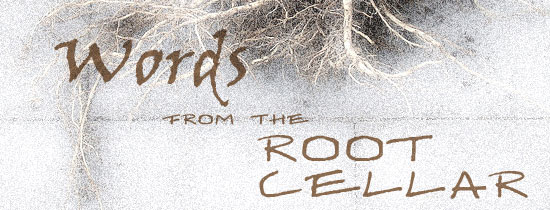When the call for columnists came out for Portland Book Review, my first idea combined two of my favorite things: books and food. No, I’m not a rabid gastronomist, though I do love a good steak dinner, and I adore the bonding time in the kitchen with my honey allows. My focus on food comes from a rarer angle: that of the producer rather than the eater.
I’m a sixth generation farmer and still live in the house (happilyrenovated) that my great-great-great grandparents built in the 1880s. Growing food, one could argue, is in my blood. But as a rabid bibliophile, I also need words, or else, my honey assures me, I turn into a raging, destruction-seeking, hero-slaying mother of Grendal. So I’m always seeking ways to synch farming and words into my life. They are not, as some believe, mutually exclusive. And of course, having recently read Michael Pollen’s The Omnivore’s Dilemma and embarking into the world of Joel Salatin and company, into the world of alternative natural agriculture, even further inspired me to seek ways to combine words and food. Food is basic. Seeds want to grow. Animals want to procreate. Our job as farmers is to give them this opportunity to grow and thrive.
We’re not born knowing how to farm, though sometimes it may seem like it. Sitting there listening to the county extension agent makes farming seem like a math problem: input so many pounds of product A, add so many pounds of product B, and presto! You get so many bushels per acre. This type of food production is a relatively new phenomenon, which I only learned recently. Throughout human history farmers have depended on their knowledge of the land and prowess of range management rather than on scientific formulas.
This realization freed me. A natural-born bibliophile and college English major, you can probably guess that numbers aren’t my strong-suit. But observation and record-keeping are well within my skill range. I’d rather take careful note on the attitude one of my Simmental cows displays prior to calving than configure a rate-of-gain ratio. With the other realization that grass rather than corn is the better feed for an herbivore (surprise of surprises), my family embarked on a remission in agriculture. Rather than try to compete in the “modern” marketplace, we decided to return to what we knew best: holistic management of the farm and producing food from sunlight and grass, without the thousands of dollars of inputs in pesticides and herbicides required for most industrial farm operations.
Will this crazy return to the basics work? I don’t know. But without trying, how can we find out? I love the growing of food, and have grown passionate about the sense of community that food inspires. It’s a point of socialization often overlooked in our fast food culture. But the growing, gathering, harvesting, preserving, and preparing of food has bonded humans together, and made a place for sharing stories and history over the supper table, for time immemorial. While we can’t return to the past, we can integrate pieces of it to make stronger personal ties, stronger families, and a stronger culture. I invite all readers of Portland Book Review to explore with us.
 Axie Barclay is a Michigan writer with a cow-habit. Having discovered the joys and potential for growth in alternative agriculture, she quests ever longer and harder for ways to combine farming and writing into a business. When not milking cows, making disgruntled noises at the latest disgusting thing the heeler dogs dredge up, riding horses, or keeping the fence up around her small beef herd, she’s holed up reading an eclectic array of books or tapping out pages. When not working, she enjoys kicking back with her honey, family, and friends at a bonfire with some beers. Chat her up on Twitter and Facebook, /axieb, or barclayfarmsandlit.blogspot.com where she delves into literature and agriculture with a relish… and occasionally ketchup. Soon to be homemade.
Axie Barclay is a Michigan writer with a cow-habit. Having discovered the joys and potential for growth in alternative agriculture, she quests ever longer and harder for ways to combine farming and writing into a business. When not milking cows, making disgruntled noises at the latest disgusting thing the heeler dogs dredge up, riding horses, or keeping the fence up around her small beef herd, she’s holed up reading an eclectic array of books or tapping out pages. When not working, she enjoys kicking back with her honey, family, and friends at a bonfire with some beers. Chat her up on Twitter and Facebook, /axieb, or barclayfarmsandlit.blogspot.com where she delves into literature and agriculture with a relish… and occasionally ketchup. Soon to be homemade.

